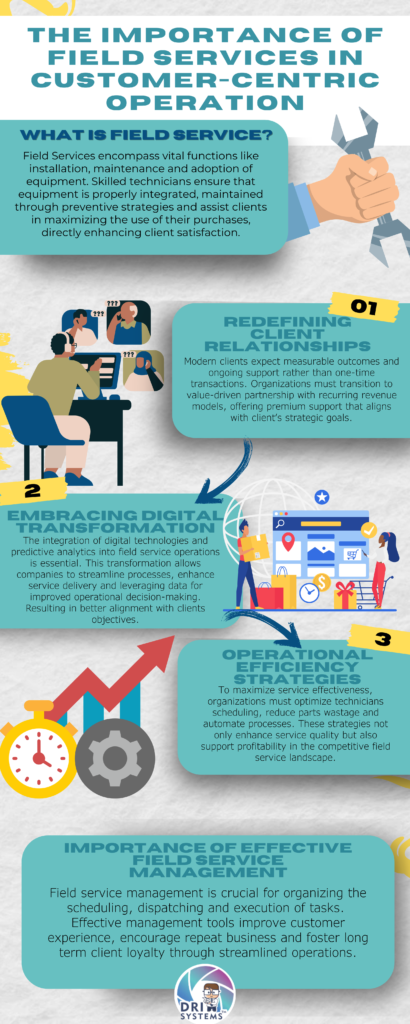
What is the essence of Field Services
Field services represent the essence of customer-centric businesses where operational precision reigns supreme. This critical field includes on-site activities such as installation, maintenance, and the complex restoration of critical hardware. By ensuring optimal performance in situation, field services boost the functionality of indispensable products—be it in enterprise IT (Information Technologies), healthcare apparatus, or industrial machinery. These services create a seamless bridge between businesses and their clients, protecting both operational continuity and satisfaction.
We dissect the pillars of field services—installation, upkeep, and problem resolution—while addressing the complexities field team’s route. Additionally, actionable plans are illuminated to improve and elevate field service operations to unprecedented levels of excellence.
What Defines Field Services?
At its core, field services relate to professional undertakings executed directly at a customer’s location, ensuring that installed products achieve their intended functionality. Across industries such as IT (Information Technologies) or skilled technician, industrial equipment, and healthcare technology, field services wield a crucial role in organizing installations, optimizing performance, and resolving interruptions.
In DRI System, an authority in the field, defines these services as covering every interaction related to deploying, managing, or refining supplier equipment installed on customer locations. Field service organizations, therefore, stand as necessary allies in a company’s journey toward operational accomplishment.
Core Activities in Field Services:
- Installation
Once a customer acquires equipment, the role of a skilled technician becomes vital in embedding it seamlessly into their operational framework. These professionals establish an initial standard for routine, ensuring the equipment integrates harmoniously with the client’s environment.
- Maintenance
Traditionally reactive, field service maintenance now increasingly adopts a forward-thinking stance. Through practical inspections, wear-and-tear assessments, and timely replacements, technicians prevent costly breakdowns and mitigate downtime, thereby enhancing client trust.
Corrective Maintenance: Interventions to restore functionality when equipment fails, covering both repairs and calibrations.
Preventive Maintenance: Scheduled evaluations to prevent equipment failures, often leveraging data analytics to be more precise.
Proactive Maintenance: A sophisticated approach wherein potential anomalies are identified and resolved before they manifest into full-size issues.
- Adoption Services
Beyond technical fixes, field service professionals often evolve into trusted consultants, guiding clients to maximize the efficacy of their purchases. Through consultative insights and operational optimization, skilled technicians contribute significantly to client satisfaction.
Navigating Challenges in Field Services
Redefining Value-Added Support
Modern clients demand tangible business outcomes, challenging traditional service models trusting on irregular, one-time transactions. As value-driven partnerships become the model, organizations must pivot to recurring revenue models, offering premium support packages that align with client goals.
Harnessing Digital Transformation
The digital revolution reshapes field service standards, shifting focus from hardware to data-centric value foundation. Companies must embrace transformation by reimagining their operational frameworks, adopting, and integrating predictive analytics for smoother service delivery.
Streamlining Service Costs
Operational efficiency remains a foundation of successful field service management. By optimizing technician schedules, minimizing part wastage, and leveraging automation, organizations can deliver top-tier services while preserving profitability.
The Imperative of Field Service Management
Field service management organizes the intricate part of scheduling, dispatching, and task execution. It ensures that every repair, maintenance, and consultation aligns with both client expectations and operational standards. Effective management tools not only enhance customer experience but also drive repeat engagements and loyalty.
Here are some essential features we advocate for in a well-rounded field service management platform:
Customer-Focused Tools: Capabilities such as consumption tracking, detailed service analytics, contract oversight, and self-service portals empower customers to interact seamlessly and stay informed.
Productivity Enhancements: Functions like spare parts logistics, mobile accessibility, video support, efficient time management, issue escalation, and healthy knowledge management streamline workflows and boost efficiency.
Infrastructure Support: Core functionalities include CRM and incident handling, installed base and asset management, device oversight, and advanced integration to drive smarter operations.
Key Takeaway in functionalities of Field Services
Field services performs a crucial role in preserving business operations by ensuring that equipment at client’s location is properly installed, maintained, and repaired. This is especially vital in, healthcare business equipment and others, where operational efficiency directly impacts client’s efficiency.
Preemptive maintenance are essential to minimizing downtime and reducing costly service requests. Leveraging knowledge, connected equipment and data insights, companies can predict and prevent equipment failures, improving client’s satisfaction and reducing operational expenditures.
Digital transformation and Iot are remodeling field service operations. Companies embracing these innovations can optimize service distribution, modernize processes, and offer enhanced, outcome-based services that align with client’s goal—driving long-term value and growth.

